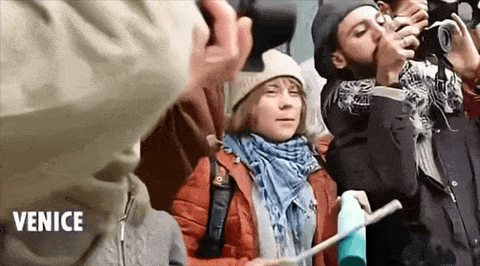
Hi Global Recap readers,
No idea how, but our first story dodged my radar (maybe yours too).
And with geopolitics unusually quiet today, there’s no excuse to skip it for being "old."
So, in case it flew past you as well… 👇🏼
🇮🇹 ITALY
Venice Bans
Greta Thunberg

Venice has given Greta Thunberg a 48 hour expulsion after Extinction Rebellion activists dyed the Grand Canal a fluorescent green to protest weak climate action at COP30 in Brazil. The canal turned into a neon postcard right as weekend tourists were queueing for gondola selfies.
But critics of Thunberg are still unsatisfied with this seemingly light slap-on-the-wrist punishment.
Stunt: Thunberg, 22, joined roughly 35 Extinction Rebellion activists who tipped green dye into the Grand Canal under the "Stop Ecocide" banner, timing the spectacle with the closing hours of the COP30 UN climate summit in Belém.
Penalty: Police responded with on-the-spot paperwork: each activist was fined about 150 euros, roughly 172 dollars, and handed a 48 hour order that bars them from entering Venice, a punishment mirrored across the whole group.
Method: Organizers insisted the dye was a fluorescent tracer commonly used in environmental studies, biodegradable and non toxic, while local officials warned the act still "risks having consequences for the environment" in a fragile lagoon system.
Spread: Venice was the headline act of a coordinated wave of actions in ten Italian cities, which included dyed fountains in Genoa and Padova and bright green rivers in Turin, Bologna, and Taranto, all framed as a visual alarm about "climate collapse."
Politics: Extinction Rebellion used the moment to attack Prime Minister Giorgia Meloni's government for resisting tougher climate commitments at COP30, arguing that Italy blocked stronger language on fossil fuels while cities like Venice face worsening flooding.
📌 Context: Venice lives on a knife edge between tourism money and tidal flooding, which has turned the city into a recurring symbol of climate risk. COP30 in Brazil just wrapped with a compromise deal that critics say dodges clear fossil fuel phaseout targets, which is exactly the gap these activists are trying to flood with green dye.
But public patience with these kinds of disruptive demonstrations seems to be wearing thin. After all, there are only so many similar stunts one can pull before they start losing their impact. And in some cases, they may even be pushing people away from the legitimate concerns about climate change.

🇻🇪 VENEZUELA
Ultimatum Over
Empty Skies

Venezuelan President Maduro
Venezuela has handed foreign airlines a 48-hour deadline to resume flights or surrender their operating rights, an ultimatum that runs directly into the U.S. Federal Aviation Administration’s warnings about rising military risk.
We all know why it's doing this. The lower the chance of civilian aircraft in the skies, the higher the chance that Maduro worries he could be targeted. If that reading holds, then the push to bring flights back looks less like a bid for normalcy and more like an attempt to surround himself with civilian traffic as a form of protection.
Trigger: After the U.S. Federal Aviation Administration warned of "heightened military activity" and a potentially hazardous situation around Venezuela, carriers such as Iberia, Air Europa, Plus Ultra, Gol, Latam, Avianca, TAP and Turkish Airlines pulled or paused routes to Caracas.
Ultimatum: Caracas responded through its aviation authority, INAC, telling those airlines to resume flights within 48 hours or see their clearances revoked, effectively forcing companies to choose between their own risk assessments and access to the country.
Backlash: The International Air Transport Association warned that yanking traffic rights over a safety dispute would further isolate Venezuela, which it already ranks as one of the least connected markets in Latin America, and urged regulators to drop the deadline.
📌 Context: The FAA alert did not come out of nowhere. Washington has built up a large naval and air presence in the southern Caribbean, including the U.S. Navy’s biggest aircraft carrier, as part of a counternarcotics operation that Caracas insists is really about regime change.

🇷🇴 ROMANIA
NATO Jets Chase
Russian Drones

NATO fighters chased two Russian drones in Romania’s deepest daytime airspace incursion since the Ukraine war began. The scramble started before sunrise and ended with one drone down in a Romanian village.
Incident: Romanian sensors picked up the first drone at 6:28 a.m. local time and a second at 7:50 a.m.
Response: German Typhoons and Romanian F-16s launched in pairs and tailed the aircraft until one slipped back into Ukraine.
Crash: The second drone was later found in Puiesti about 70 miles from the border after what officials think was a fuel failure.
Findings: Romania’s Defense Minister, Ionut Mosteanu, said German pilots had orders to shoot down the second drone if conditions allowed. Investigators later found the wrecked aircraft was unarmed and probably crashed after running out of fuel.
Spillover: Moldova also reported six overnight drone crossings and confirmed one unarmed Gerbera decoy landing on a rooftop.
📌 Context: Russia has repeatedly violated the airspace of NATO’s eastern flank since 2022 which pushed the alliance to boost patrols and set up the Eastern Sentry mission.

🇪🇺 EUROPEAN UNION
Married Here,
Married Everywhere

The EU’s top court just ruled that every member country must honor same-sex marriages performed anywhere in the union, a move that directly challenges Poland’s refusal to recognize a couple’s Berlin wedding and their access to benefits.
Case: Jakub Cupriak-Trojan and Mateusz Trojan married in Berlin in 2018 then returned to Poland and asked authorities to record their marriage so they could access health care.
Refusal: Poland denied the request because its domestic law does not allow same-sex marriage, which blocked rights granted to heterosexual couples.
Rights: The judges framed the issue as discrimination based on sexual orientation, stressing that not offering an equivalent recognition procedure to same-sex couples, while doing so for straight couples, puts queer families at a structural disadvantage in everything from social security to inheritance and parental rights.
Requirement: Countries like Poland, Hungary, Romania, Bulgaria, Slovakia, and Lithuania still don’t have to allow same-sex marriage at home, but they do have to recognize same-sex marriages from other E.U. countries for things like residence, taxes, social security, and other rights tied to marital status.
Impact: Rights groups say the decision affects couples in countries like Bulgaria, Romania, Slovakia, Lithuania, and Poland where same-sex unions lack any legal protection.
📌 Context: This is not a one-off, though. In a 2018 case involving Romanian citizen Adrian Coman and his American husband Clai Hamilton, the same court already held that the word "spouse" in E.U. free-movement law is gender neutral, although Romania has been slow to comply and now faces a complaint at the European Court of Human Rights.

